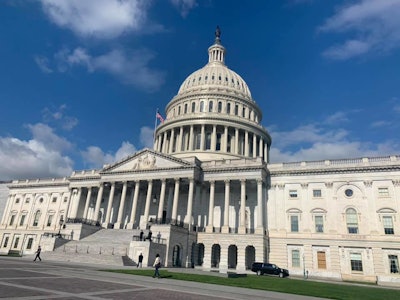
Last week, eleven U.S. senators this week joined 10 colleagues to support a five-year, $974 billion infrastructure package. The group of 21 includes 11 Republicans, nine Democrats and one independent. If signed into law, it would represent the largest infrastructure investment in American history. The plan includes $579 billion in new spending to rebuild America’s roads and bridges, improve public transit systems, invest in broadband infrastructure, and upgrade our airports. Other details of the bipartisan framework include:
- $110 billion for roads, bridges and major projects
- $66 billion for passenger rail
- $48.5 billion for public transit
- $25 billion for airports
- $20 billion for an infrastructure financing authority
The senators propose repurposed COVID-19 relief aid, electric vehicles fees, indexed federal gas tax revenue, private activity bonds, and other financing options as pay-fors. White House officials were reportedly encouraged by the proposal however it is reported that President Biden will not support a gas tax hike.
“The President has been clear throughout these negotiations: He is adamantly opposed to raising taxes on people making less than $400,000 a year,” White House spokesman Andrew Bates said. “After the extraordinarily hard times that ordinary Americans endured in 2020 — job losses, shrinking incomes, squeezed budgets — he is simply not going to allow Congress to raise taxes on those who suffered the most.”
Biden has also not said if he supports this bipartisan package as a whole.
"We need a few more details about the deal and about the proposal, including specifics about how to pay for it," White House Press Secretary Jen Psaki said on CBS This Morning.
On the other hand, progressives are worried that a bipartisan bill would leave out some of their priorities. And if Democrats try to pass a second, supplemental bill to add their priorities, the political capital will have already been spent. If Biden does throw his weight behind the five-year plan, Democratic strategists predict the party will quickly unify behind him, even if they do so reluctantly.
Why this bill matters:
Progressives would prefer that Biden drop the bipartisan talks altogether and focus on rallying Democrats behind one package that would pass through the Senate with a simple-majority vote under budget reconciliation. While moderates want to continue bipartisan talks in hopes of finalizing a compromise agreement, liberals are betting Biden has enough political muscle to push a reconciliation bill through Congress right now.
According to the American Roads & Transportation Builders Association (ARTBA), having 11 Republican senators support an infrastructure deal could avert the need for Democrats to pass a bill through budget reconciliation. The 21 senators are working to build support among moderate wings of their party, expanding outwards. They are expected to continue outreach to key groups, such as the House Problem Solvers Caucus and congressional leadership. Another challenge is finding agreement with the White House on the pay-fors.
Psaki noted the Senate is moving forward with the reconciliation process for infrastructure, which would require only a simple majority, and the White House is in support of using multiple tracks to get its priorities passed.
"I think the question here is, what can we agree on, Democrats and Republicans? Can we rebuild our roads, our railways and our bridges? The president is eager to continue those discussions and see if we can make big progress this week," she said.




















